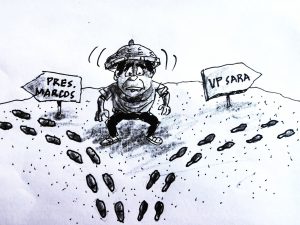As the next national elections draw near, the political landscape is already starting to shift dramatically. President Ferdinand “Bongbong” Marcos Jr., whose first term has been marked by a mix of public skepticism and staunch loyalty among his supporters, is likely gearing up for a re-election bid. However, he may face a formidable opponent in Sara Duterte, the current Vice President and daughter of former President Rodrigo Duterte. This clash could reshape the political dynamics in the country, setting the stage for an intense and unpredictable electoral battle.
Sara Duterte, once considered one of the most trusted political figures in the Philippines, has seen her prominence wane since she opted to run as vice president alongside Marcos Jr. in the previous election. Her decision to take a backseat may have contributed to the erosion of her once towering trust ratings, as the public has largely seen her in a more passive role compared to her time as Davao City mayor. If she decides to challenge Marcos Jr. in the upcoming elections, she will likely face an uphill battle to regain the trust and support that made her a political powerhouse in the past.
The anticipated rivalry between Marcos Jr. and Sara Duterte is not just about individual ambitions; it reflects the broader realignment of key political figures and factions in the Philippines. Politicians and power brokers are now maneuvering to secure their positions and ensure their survival in what promises to be a highly contentious election. Alliances are being formed, broken, and reformed as everyone seeks to align themselves with the likely winners or hedge their bets by remaining flexible in an increasingly uncertain political environment.
This period of realignment and repositioning showcases the volatile nature of Philippine politics, where loyalties can shift rapidly, and yesterday’s allies can become tomorrow’s adversaries. As the election draws closer, we can expect more behind-the-scenes deals, public endorsements, and political statements aimed at swaying public opinion and securing the best possible outcome for those involved. The stakes are incredibly high, and the strategies employed by these political actors will likely have far-reaching implications for the country’s future.
In the end, the outcome of these political maneuverings will not only determine who occupies Malacañang but also shape the direction of the Philippines for years to come. Whether Marcos Jr. manages to retain his hold on power or Sara Duterte emerges as a formidable challenger, the real question will be how these leaders will address the pressing issues facing the nation. As voters, Filipinos must remain vigilant and discerning, looking beyond the political theater to consider which candidates truly have the country’s best interests at heart.




